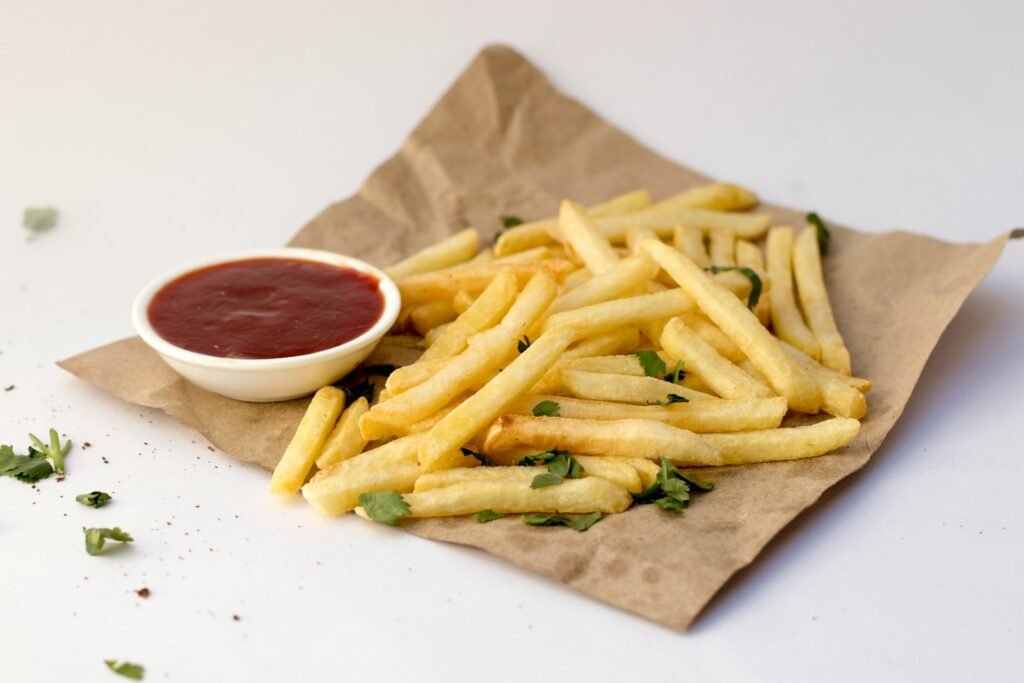If you’re taking metformin for type 2 diabetes, you might wonder about foods that could affect how well it works. Metformin helps control blood sugar, but your diet plays a big role too.
While on metformin, it’s best to avoid foods high in sugar and simple carbs. This includes things like soda, candy, and white bread. These can make your blood sugar spike, which is exactly what you’re trying to prevent.
You’ll also want to be careful with high-fiber foods. Too much fiber can make metformin less effective.
Try to keep your daily fiber intake under 30 grams. Instead, focus on eating lean proteins, vegetables, and whole grains. These foods can help you manage your diabetes and get the most out of your medication.
Understanding Metformin and Diet Interactions
Metformin and your diet work together to manage blood sugar levels. What you eat can affect how well this medication works and your overall health.
How Metformin Works
Metformin helps control blood sugar levels in people with type 2 diabetes. It does this by:
- Reducing sugar production in your liver
- Improving how your body uses insulin
- Slowing down sugar absorption from food
This medicine makes your cells more sensitive to insulin, which helps lower your blood sugar. Metformin can also help you lose weight, which is good for managing diabetes.
Potential Risks with the Wrong Diet
Eating certain foods while taking metformin can cause problems. Here are some risks to watch out for:
- High-sugar foods can counteract metformin’s effects on blood sugar
- Too much fiber might lower the amount of metformin in your body
- Alcohol can increase your chance of getting lactic acidosis, a rare but serious side effect
To stay safe, avoid sugary drinks, white bread, and fatty foods. Instead, choose whole grains, lean meats, and vegetables. These foods have a lower glycemic index, which helps keep your blood sugar stable.
Specific Foods to Avoid While on Metformin
When taking metformin, it’s important to be careful about what you eat. Some foods can make the medicine less effective or cause side effects. Here’s what you need to know about foods to avoid.
Alcohol and High-Fat Foods
Drinking alcohol while on metformin can be risky. It may lower your blood sugar too much. This can lead to feeling dizzy or weak.
Try to limit or avoid alcohol when you’re taking this medicine.
High-fat foods can also be a problem. They can make it harder for your body to use metformin properly. Foods like:
- Fried foods
- Fatty meats
- Full-fat dairy products
These can slow down how well metformin works. They might also upset your stomach. It’s best to choose lean meats and low-fat dairy instead.
Refined Carbs and Sugary Drinks
Refined carbs and sugary drinks can quickly raise your blood sugar. This works against what metformin is trying to do. Foods to watch out for include:
- White bread
- White rice
- Pasta
- Sugary cereals
- Soda
- Fruit juices with added sugar
These foods can make it harder to control your blood sugar. Try whole grain options instead of white bread or rice. Water or unsweetened tea are better choices than sugary drinks.
Excess Saturated and Trans Fats
Too much saturated fat can make it harder for metformin to work well. Foods high in saturated fats include:
- Butter
- Cheese
- Red meat
- Coconut oil
Trans fats are even worse. They’re often found in:
- Packaged snacks
- Some baked goods
- Some fast foods
These fats can increase insulin resistance. This makes it harder for metformin to do its job. Try to choose foods with healthy fats like olive oil, avocados, and nuts instead.
Healthy Dietary Choices for Metformin Users
Eating the right foods can help metformin work better. A good diet also keeps your blood sugar steady and helps you feel your best.
Incorporating High-Fiber and Whole Foods
Whole grains, fruits, and vegetables are great choices when you’re on metformin. These foods are packed with fiber, which slows down how fast your body takes in sugar. This helps keep your blood sugar levels even.
Try to fill half your plate with non-starchy veggies like broccoli, spinach, and carrots. Add some whole grains like brown rice or quinoa. For fruit, go for whole fruits instead of juice. Berries, apples, and pears are good picks.
Beans and lentils are also great. They’re full of fiber and protein. Nuts and seeds make good snacks too. Just watch your portions, as they’re high in calories.
Balancing Macronutrients and Hydration
It’s not just about what you eat, but how you balance your meals.
Aim for a mix of carbs, proteins, and healthy fats at each meal. This helps keep your blood sugar steady.
Lean proteins like chicken, fish, and tofu are good choices. They help you feel full without spiking your blood sugar. Greek yogurt is another good option. It’s high in protein and low in sugar.
Don’t forget to drink plenty of water. Being well-hydrated helps metformin work better. It also helps flush out extra sugar through your urine.
Try to spread your meals out evenly throughout the day. This can help keep your blood sugar levels more stable. Eating smaller, more frequent meals might work better than three big meals.
Managing Comorbid Conditions with a Balanced Diet
People with diabetes often have other health issues. A good diet can help manage these problems and keep you healthy.
Dietary Considerations for PCOS and Prediabetes
If you have polycystic ovary syndrome (PCOS) or prediabetes, watching what you eat is key. For PCOS, try to:
- Eat more fiber-rich foods like beans and vegetables
- Choose lean proteins such as chicken or fish
- Limit processed foods and added sugars
For prediabetes, focus on:
- Whole grains instead of white bread or pasta
- Lots of colorful fruits and veggies
- Small, frequent meals to keep blood sugar steady
A diet plan that’s low in sugar and high in nutrients can help both conditions. This approach can improve insulin sensitivity and help control your blood sugar.
Heart Health and Kidney Function
Your heart and kidneys need extra care when you have diabetes. To protect these organs:
- Cut back on salt to help your heart and kidneys
- Choose heart-healthy fats like olive oil and avocados
- Eat more plant-based proteins like lentils and nuts
For better kidney health:
- Keep an eye on your protein intake
- Drink plenty of water
- Avoid too much potassium if your doctor advises it
These steps can help lower your risk of heart failure and kidney problems.
Frequently Asked Questions
Managing your diet while taking metformin can be tricky. Here are some common questions about food choices and metformin use.
What type of breakfast is recommended for those taking metformin?
A good breakfast while on metformin should include whole grains, lean meats, and fruits. You can try oatmeal with berries and nuts, or whole grain toast with eggs and avocado. These options help keep your blood sugar stable.
Which fruits should be avoided when on metformin treatment?
You don’t need to avoid any fruits completely. But it’s best to limit very sweet fruits like mangoes or grapes. Choose lower-sugar fruits like berries, apples, and pears instead.
Are there specific foods that can interact negatively with metformin?
Yes, some foods can affect how well metformin works. Avoid sugary drinks, white bread, and fatty foods. These can make it harder for metformin to control your blood sugar.
Can I consume bananas while on a metformin regimen?
You can eat bananas while taking metformin. But eat them in moderation as part of a balanced diet. Bananas have more sugar than some other fruits, so don’t overdo it.
What dietary approach should be taken for managing PCOS with metformin?
For PCOS, focus on a high-protein, lower-carb diet. This can help manage your blood sugar and weight. Choose lean meats, fish, eggs, and veggies. Limit processed foods and sugary snacks.
How should one modify their diet when experiencing gastrointestinal side effects from metformin?
If metformin upsets your stomach, try eating smaller meals more often. Stick to bland, easy-to-digest foods like rice, bananas, and toast. Avoid spicy or fatty foods that might make symptoms worse.


